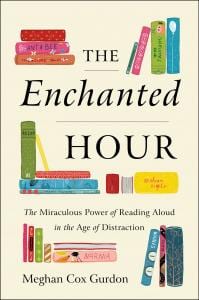I’m a sucker for new books. I am especially susceptible to pick up a book on reading or writing.
 Not long ago, we stopped at the public library to reload. On the new titles shelf I found Meghan Cox Gurdon’s book The Enchanted Hour: The Miraculous Power of Reading Aloud in the Age of Distraction.
Not long ago, we stopped at the public library to reload. On the new titles shelf I found Meghan Cox Gurdon’s book The Enchanted Hour: The Miraculous Power of Reading Aloud in the Age of Distraction.
The words that stuck out were “Power,” “Reading Aloud,” and “Distraction.” Per other posts on this blog, I myself struggle with distraction on a regular basis. The idea of reading aloud as a device for breaking distraction’s hold was intriguing. Also per the distraction post, Gurdon’s book was the one I devoured after a weekend of video gaming.
As the Wall Street Journal’s children’s book reviewer since 2005, Gurdon brings a wealth of understanding about reading and writing. She talks specifically about the developmental impact of reading aloud to children (Goodnight Moon figures heavily in the picture, thanks for asking). Gurdon also talks about the impact of reading to her children well into their mid- to late teens.
Everything from The Fault in Our Stars to The Hobbit echoed through her home. Her children testify to the goodness of these moments.
As I finished the book, I sat for a bit with her assertion that screens don’t provide the imaginative stimulation that listening to a story gives. A good reader will create voices, or at least change intonation for the different portions of the book.
The voice of one such as Reepicheep in C.S. Lewis’ The Chronicles of Narnia needs to have a distinctly “mousy” ring so that listeners can imagine the brave but small presence in Prince Caspian and The Voyage of the Dawn Treader.
Listening, rather than watching (via movies) or even reading to oneself engages the imagination in healthier ways.
But for listening to occur distraction has to be dismantled. We cannot hold a story while listening without learning to shut out the stimuli all around us. No one can truly multitask, or multi-listen; we’re all simply missing something.
A quote from Gurdon caused me to dog-ear the page, with apologies to later library patrons for the creased corners:
Children get a wider perspective when they’re tugged out of the here and now for a little while each day. In an enchanted hour, we can read them stories of the real and imagined past…With any luck, our children will come to appreciate that the people of generations past were as full of life, intelligence, wisdom, and promise as they are, and impelled by the same half-understood desires and impulses; that those departed souls were as good and bad and indifferent as people who walk the earth today. (150)
The first thing that came to mind was one word: Scripture.
The stories and wisdom of Scripture weren’t written down in their first iteration. The Hebrew stories of creation, disobedience, exile, and exodus were fireside chats. Dinner tables (or wherever meals were shared) included a recitation of their history with God.
The reason there are so many repeated phrases in the Old Testament, so much poetry with singing phrases, is because those are mnemonic gems. To remember stories you have to be able to hold them in your mind.
In Gurdon’s words, they had to remember events of the “real past.” Telling and retelling these stories orally helped everyone learn the “intelligence, wisdom, and promise” of a life with God.
Jesus’ parables were spoken out loud. People envisioned camels pushed through a needle’s eye. The younger son came to mind, sinking in the mud salivating over pig pods. Paul’s letters were read out loud to the community. People’s minds whirled with the delightful complexity of the arguments in Romans. Which leads to a significant point:
The Christian faith as we know it would not have survived without reading aloud.
One morning I decided to share a quote from St. Julian of Norwich with my wife. We sat in the early-hour glow of March, waiting for the sun to crest and light the waking world. This particular quote struck me:
I saw that the love which made (Jesus) suffer is as much greater than his pain as heaven is greater than the earth…It was because of this love he said, ‘If I could possibly have suffered more, I would have done so.’ He did not say ‘If it were necessary to have suffered more.’ Though it were not necessary, yet if he could suffer more, he would do so. This deed and this work for our salvation was ordered as well as God himself was able to order it. And I saw Christ’s complete happiness; his happiness would not have been complete if it were at all possible to have done it better. (Revelations of Divine Love, 98)
Something changed as I read this quote out loud. My enunciation, pauses, and emphases made the whole experience different. The feeling of inspiration I had at reading the quote only grew when I read it out loud.
I thought about Meghan Cox Gurdon’s premise: reading aloud creates a mind that can move beyond distraction.
Then I thought about the early church: without reading out loud as a community, would Christianity have survived?
After that, I wondered: if I had not read dear St. Julian aloud to my wife, would that quote have taken on such depth and beauty?
Perhaps there is a challenge here we all should take on – whether or not reading aloud could save our minds and even our faith?











